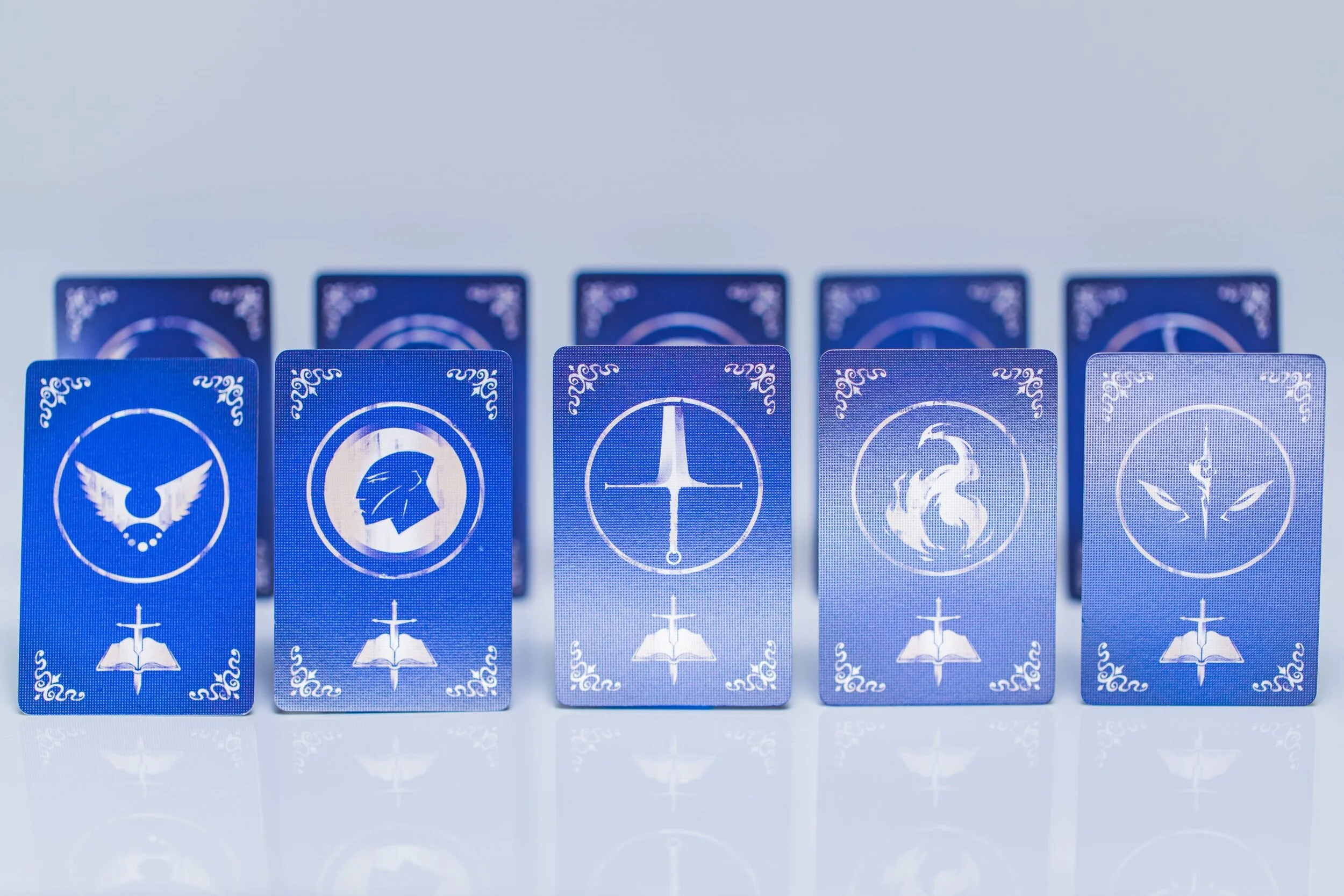Pendulum – First Impressions
Review copy provided by the publisher
Pendulum is a real-time strategy game from designer Travis Jones, artist Robert Leask, and the publishing team at Stonemaier Games.
It’s a competitive game that pits players against each other as power-hungry nobles who are looking to consolidate power in the vacuum left behind by the Timeless King. Four different victory tracks represent the power, prestige, popularity, and legendary status of these nobles and the player who progresses the furthest by the end of the game’s four rounds will win.
While games like Scythe and Wingspan maintain a high level of devotion from many fans in the tabletop community, it seemed like Pendulum was more polarizing in its reception. The real-time mechanic may have been off-putting to some. The abstract gameplay may have surprised some who were expecting a more immersive world. Or it may just not have hit the right notes for gamers out there.
However, coming off of Sorcerer City, I was interested in this real-time game, and I do enjoy much of what Jamey Stegmaier has designed or published over the years. So it seemed like a no-brainer to give Pendulum a try.
Whether it’s timed or untimed, there is an intriguing premise here. Let’s see how Pendulum plays.
What It Does
In this fantasy world, players exist in just one of the many epochs that have stretched across the timeline. And while the gameplay is rather abstract and the mostly language-independent experience doesn’t dive deeply into the world once you’ve set up the board, Pendulum does have some fleshed-out lore that complements the mechanics of the game and creates a nice backdrop for what the players are doing. Check out that sweet sweet flavor text:
When the gods first created the world, Dünya, they gave into order. Violence reigned, and only the strong eked out a desperate survival. This was the Time of Chaos. The dragons grew into a terrifying power, and eventually they stood unmatched and claimed dominion over Dünya. They instilled an order on the world, though one of suffering and misery. This was the Time of Darkness.
Finally, one man, Surcil, caught the affection of Gahael, god of the changing seasons and the keeper of time. Gahael bestowed a portion of his power to Surcil, making him immortal, and Surcil threw off the oppressive rule of the dragons. He became the Timeless King and ruled Dünya for centuries, maintaining the peace. This was the Time of Order. Now, the Timeless King has vanished, and his empire is in disarray. Why he left or to what fate he came, no one seems to know, though mysterious rumors have circulated. The political strings he so subtly pulled over the years have begun to unravel into an unstable power vacuum. This marks the Time of Change.
When Gahael gifted the Timeless King his power, he also forged a great iron clock that was placed in the Grande Plaza of Montbrielle. Gahael declared that the clock would continue to run as long as the Timeless King ruled. With his disappearance, the clock has come to a stop, the iron pendulum hanging perfectly still below the etched glass of its face. It is immovable by any hand that attempts to restart it. Legends hold that when a leader truly succeeds the Timeless King, they will visit the Grande Plaza and swing the pendulum, restarting the iron clock, and marking the beginning of a new era.
Honestly, I enjoy narrative immersion. I prefer well-established worlds and visual anchors in board games.
Pendulum doesn’t have that. It’s a game that relies on iconography, resource management, and time-crunch decision-making. It’s an abstracted struggle for power in the kingdom.
But… well-written flavor text and lore-building can do a lot with a little. I feel like I understand this world. The characters, and their motives, make sense. It’s all grounded in the context of a frenzied conflict for the throne. Nobles vying for supremacy. And a land whose history is divided up into notable eras. Into epochs. Into different times. All of that fits the mechanics of the game and provides a reference for what players are trying to achieve.
These nobles will engage in the same fight but will approach it from asymmetric angles. It’s a game of efficiency. Of making mistakes. And of navigating the best path through the maze of power, prestige, popularity, and achievement.
How It Does It
Obviously, the biggest part of Pendulum is the real-time action selection. There are timers of varying length (45 seconds, 2 minutes, and 3 minutes) and where the timers are placed on the board determines which workers you can move and which workers you can activate for action resolution. Workers in rows with timers cannot be moved but can resolve actions. Workers in rows without timers can be moved or reclaimed but cannot resolve actions. That’s the major rule to remember.
When you’re learning how to play, the rulebook suggests that you spend the first round moving through the actions in untimed order. And there are also plenty of people online who prefer to play that way always. I, however, would recommend that you start adhering to this mechanism as soon as possible. It’s the core design of the game and is part of what makes it unique.
Otherwise, it’s a strategy game that is simpler in execution than others and it loses a lot of the appeal. That time constraint adds a lot of variables into the mix that players may ultimately appreciate. One thing I have learned from games like Galaxy Trucker and, most recently, Tiny Turbo Cars is that time constraints introduce an altered state of strategy. You can’t be perfect. You can’t line everything up all the time. You have to make decisions on the fly and adapt to the new state of play. Yes, if you wait, players will be able to perfect or optimize their strategy. Turns will be more efficient. Progress will be faster. Results will be better. But it becomes a game of optimization. That’s the beating heart.
Pendulum is not asking you to be perfect. It’s challenging you to be great in spite of the mistakes you make. It’s wondering if you can win even when you don’t get it all right. And it’s doing something different.
Other than the real-time action selection, there are a lot of mechanics that will be familiar to many boardgame lovers: variable player powers, worker placement, resource management, (super truncated) deck-building.
Each noble has their own set of four cards that will enable them to perform actions outside of the real-time play. Also, the nobles have different length victory tracks for power, prestige, and popularity, which means players will likely have a different approach from each other as to what resources, action spaces, and worker movements they prioritize. The four noble cards can also be bolstered, though, with other cards at the end of the round if players want to pay for them. The small hand of noble cards and the potential to buy more encompass the variable player powers and the (really light and almost not there) deck-building.
Worker placement and resource management go hand-in-hand. Players have two workers to start—one regular and one Grande. If you’ve played Viticulture, you’ll understand the overriding power of the Grande worker. And the action spaces on the board, either freed up or locked down by the location of the timers, will reward players with resources to carry out stronger actions as well as advancement on the victory tracks.
All of these smaller mechanisms revolve around and are influenced by the real-time action selection, though.
Why You Might Like It
There aren’t a lot of real-time strategy games out there. At least that I know of. Pendulum offers a rare chance to engage in an abstract puzzle while fighting against both time and the other players.
As usual, the production quality from Stonemaier Games is fantastic, and it’s clear that you can get a lot of plays out of this before you’d see any wear and tear.
Why You Might Not
The timers can be a little fiddly, sometimes, so players will need to make sure that the sand is flowing properly or the game’s main conceit falters.
The untimed method of play does help make the mechanics more accessible and enable you to experience the game if you can’t abide the timers, but I discourage you from relying on it. This game plays best as intended, with timers running and players scrambling.
Final Thoughts
Circling back to the polarizing nature of Pendulum, I must say that I didn’t find the game or the style of play off-putting. It was a refreshing change from other games that I’ve had on the table recently, and while I only managed a two-player game, I’m really interested to see how this would fare with three or four players. I think it would be much more interactive as players are competing for particular action spaces, using their smaller workers to block off locations or depending on Grande workers to upend the placement restrictions and get in on an essential action.
Another thing I appreciate is how language-independent the experience is. It makes it really accessible for gamers who aren’t able to or aren’t interested in text-heavy gameplay. Once you understand what the icons mean, you’re able to quickly start figuring out strategy and combining action spaces together for effective results.
Now it’s possible that after five or six plays, the initial allure will fade and I’ll have discovered the best ways to navigate or manipulate the real-time frenzy. That’s definitely possible.
But I like what I see right now. Once the rules are understood, the game becomes a series of micro-judgments, where players have to weigh the advantages of grabbing an action on a location with fast turnover thanks to the black timer or waiting for the powerful and essential actions with the slow-moving purple timer. Or the middleweight green timer and the strong actions available there. It’s a quick decision that must be made. And you’ll do that repeatedly over the course of the game. It’s an engaging enigma to decipher. A fun puzzle to solve.
I’m also curious about the advanced character boards, which make for a tougher game as players adapt to small rule adjustments or victory conditions. That will be something I explore in later games.
We will see!
For now, it’s a thumbs-up, yet further investigation is needed. If you want to check out Pendulum, you can visit Stonemaier Games or read what the community thinks on BoardGameGeek.
Have you played Pendulum? Do you like any other Stonemaier Games?
Let us know in the comments and give a recommendation for other games of which to share our first impressions.











